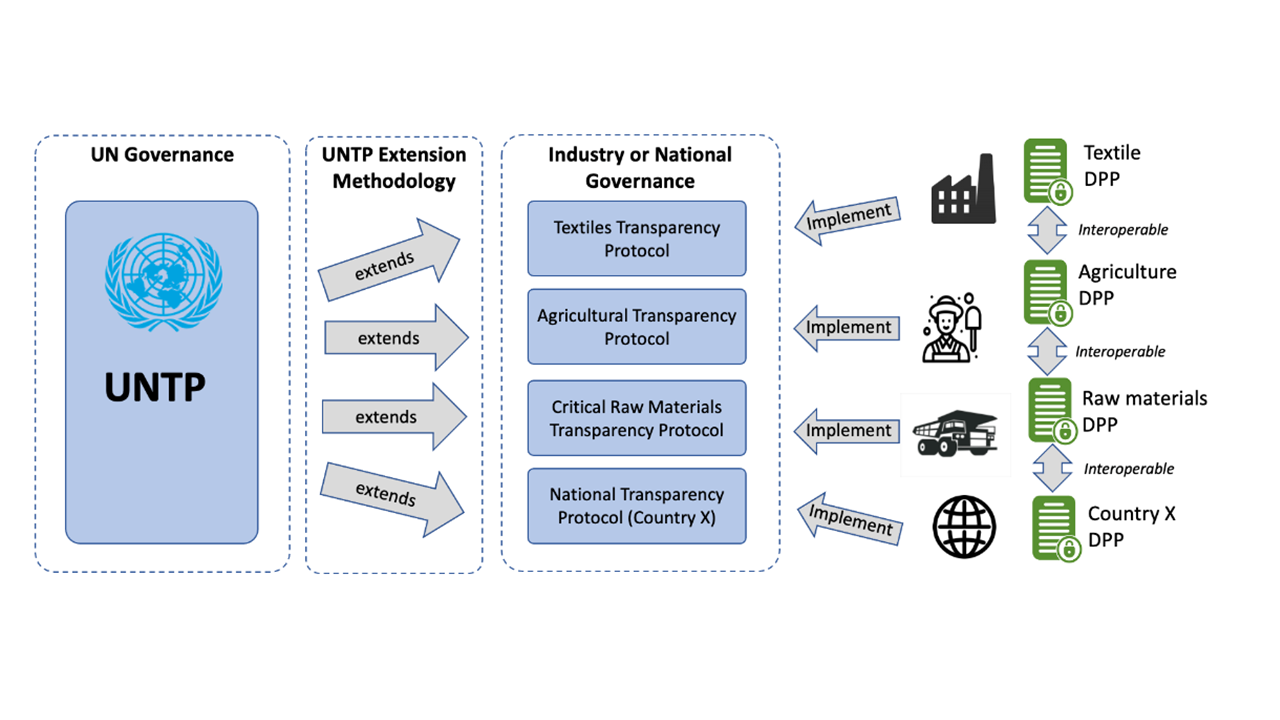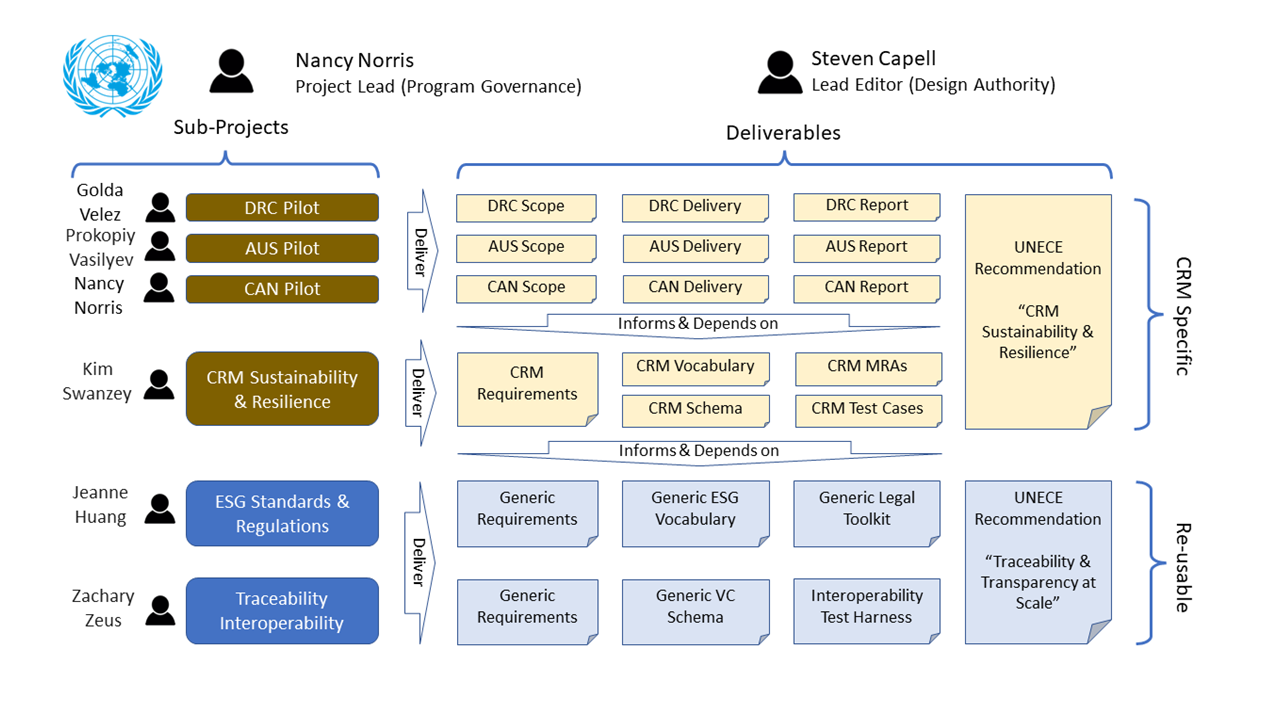Governance - UNTP Extension
Please note that this content is under development and is not ready for implementation. This status message will be updated as content development progresses.
UNTP Extension
The standard being developed through this project is an extension of the United Nations Transparency Protocol (UNTP). UNTP-CRM adapts UNTP to meet the specific needs of the CRM industry using the UNTP Extension Methodology. To the greatest extent possible, we use the core UNTP methodology and architecture to ensure consistency, and cross-industry interoperability.

Phase 1: Development
The first phase of the project is currently underway, and focuses on the development of UNTP-CRM Version 1.0. This phase of the project is governed using the following principles and structures.
Principles
- UN/CEFACT Open Development Process is consensus-driven, collaborative, open and transparent.
- Aligned to United Nations Sustainable Development Goals (UN SDGs).
- The project will define and deliver practical, useful ways to add value. We will build real, usable tools that facilitate global implementations.
- The project will build upon related work already completed and underway by UN/CEFACT and other organizations and initiatives.
Roles
- Project Lead (Nancy Norris): The Project Lead will coordinate the planning, implementation and monitoring of activities. The Project Lead will facilitate the implementation of the project in all its stages and provide leadership in alignment with the UN/CEFACT’s goals throughout the context of the project.
- Lead Editor (Steven Capell): The Lead Editor will collate (and edit as necessary) contributions from team members / sub-editors. If there are conflicting opinions on a topic from the team, the lead editor will seek consensus wherever possible and make decisions as a design authority between possible options in accordance with the project goals & principles.
- Project Team: Composed of the Project Lead, Lead Editor, and Workstream Leads, this team assists the Project Lead with project implementation.
- Workstreams: Each area of focus will have an associated working group with a lead. The workstream lead is responsible for organizing meetings, consolidating the working groups’ contribution to the draft deliverables, and reporting on progress to the Project Team on a weekly or bi-weekly basis, as needed.
Scope & Areas of Focus
Activities have been scoped to ensure project deliverables add value, are not duplicative, and are informed by other related projects.
Technology interoperability
- Focus: Research and develop a standard for technological interoperability.
- Expertise required: Expertise in technological interoperability between supply chains, experience building open standards and contributing to interoperability solutions (i.e. blockchain or otherwise). Experience leading research projects related to verification, digital fingerprinting, and traceability of materials within supply chains.
Sustainability criteria
- Focus: Define how sustainability information criteria will be exchanged along the supply chain, developing an understanding of equivalency across borders and unique supply chain systems.
- Expertise required: Expertise in the development of sustainability standards, mining performance certifications, and efforts focused on improving the overall sustainability and social impact of supply chains.
Legal/ethical considerations
- Focus: Understand legal and ethical considerations related to supply chains, including audit/verification processes that are connected and recognized across multiple jurisdictions. Scope will include:
- Legal enforcement of false claims
- Mutual recognition of laws along the supply chain
- Expertise required: Law professionals, especially those focusing on conflict of law on free trade agreements. Professionals with experience in privacy law, information sharing agreement law, and digital information regulatory compliance security.
Implementations
- Focus: As the UNTP-CRM standard is developed, early implementers will assist the Project Team with testing draft deliverables and providing feedback. Insights from implementers will be used to refine deliverables to increase their usability and practicality.
- Expertise required: Requires technical and industry expertise to integrate feedback received into refinement of the standard.
Workstreams
Each area of focus will have an associated workstream, with a lead. The leads have been selected from those who have indicated their interest using the following criteria:
- Capability (must have sufficient domain knowledge to do the job)
- Capacity (must be able to allocate sufficient time to do the job) and
- Neutrality (must be acceptable as independent/non-competitive to all team members)
Workstreams meet as needed in order to contribute meaningfully towards the development of draft deliverables. Workstream leads report progress at Project Team meetings. Workstreams leads include:
- Traceability Interoperability - Zachary Zeus
- Sustainability Criteria - Kim Swanzey
- Implementation Pilots - Lithium supply chain - Dr. Prokopiy (Prok) Vasilyev
- Implementation Pilots - Copper supply chain - Nancy Norris
- Implementation Pilots - Cobalt supply chain - Golda Velez
- Legal Analysis - Dr. Jeanne Huang
- Engagement and Partnerships - Radha Patel
As of July 2024, the Traceability Interoperability and CRM Sustainability Criteria workstreams have completed their draft deliverables, which can be accessed in the Technical Specification and Guidance for Implementers sections of this website, respectively. The project has now progressed to an Implementation phase, in which implementers will assist the Project Team with testing draft deliverables and providing feedback. Insights from implementers will be used to refine deliverables to increase their usability and practicality, which are principles of the project, as well as the criteria listed below. Refined deliverables will be assessed by the Legal Workstream for legal and ethical considerations.
Deliverables
This phase of the project will deliver a suite of materials that support government policymakers, CRM industry actors, and traceability technology providers. The blue-coloured deliverables are expected to be re-usable across other supply chain domains such as garments & footwear and agri-food. The yellow-coloured deliverables are specific to the critical raw materials domain.

Criteria for assessing deliverables
- Affordability: Affordability of the deliverable is defined as how many adopters along the supply chain can invest in and implement the recommendations without prohibitive cost.
- Reliability: The standards and recommendations developed and implemented by this group must be reliable across different supply chain ecosystems and jurisdictions.
- Accommodability: Deliverables are assessed on their ability to accommodate multiple supply chain solutions across jurisdictions by maintaining a technologically agnostic approach.
- Scalability: Deliverables will be assessed based on their ability to scale across multiple jurisdictions, legal frameworks, regulatory environments, and technological limitations.
- Alignment to SDGs: Deliverables will be assessed based on their alignment with the UN SDGs.
- Privacy-preserving: Deliverables will be assessed on information security and privacy-preserving characteristics.
- Transparency-creating: Deliverables will be assessed on their ability to further transparency and trust along supply chains.
Phase 2: Maintenance
Governance structures for the maintenance phase will be determined prior to the completion of Phase 1.
Meetings
Call Schedule
Project Team Meetings
- Fortnightly calls: Microsoft Teams Meeting Link; Meeting ID 229 018 415 830 and Passcode: NqSYnV
- Traceability Interoperability Workstream meetings have now concluded and results are published in the Technical Specification section of the UNTP-CRM website.
- Sustainability Criteria Workstream meetings have now concluded. Workstream members may be asked to review the final version of the deliverable for this workstream once stakeholder feedback has been incorporated.
- Fortnightly calls: Microsoft Teams Link; Meeting ID 337 823 397 892 and Passcode: xueW73
As the Lithium, Copper and Cobalt Pilot Implementations get underway in September 2024, workstream leads may seek the advice of contributors who indicated their interest and expertise in these areas.
Contributors’ Meeting Summaries
During the early stages of the project (July to December 2023) the Project Team held regular sessions with all Contributors to seek advice as deliverables were being conceived and drafted.